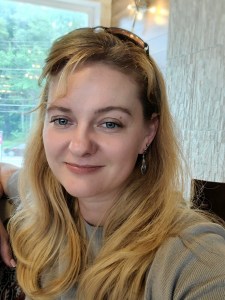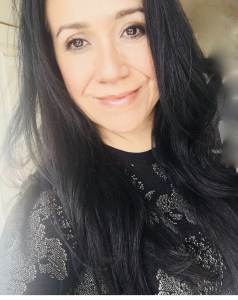COVID & Us: Immigrant women share pandemic stories
Marwa Kuri, Victoria Shulga and Marcela Cameron, the Halifax coordinator of the COVID & Us project, share their experience from the “COVID & Us: Newcomer Women in Pandemic” project with Halifax Examiner. Read more about this fantastic new project hosted by The Shoe Project.

Marwa Kuri of Halifax was one of several immigrant women who shared their pandemic stories through The Shoe Project. Kuri recorded an essay she wrote about how COVID-19 helped her discover her inner baker.
Marwa Kuri and Victoria Shulga are two immigrant women now living in Halifax who had a chance to share their pandemic stories through a project called COVID & Us. Kuri and Shulga both connected with the organizers through The Shoe Project, which was started in Toronto in 2011 by novelist Katherine Govier, who, in a small-world connection, was my magazine professor at Ryerson in 2000. That project has immigrant woman share their immigration stories through a particular story about a pair of their shoes. Women from across the country take part. Since then, more than 250 women have shared stories, some of them at live events, including at Pier 21 in Halifax. But the pandemic put an end to that idea. Still, Kuri and Shulga and many others had stories to share. So, Shulga, along with two other organizers in Halifax, found immigrant women in the city who wanted to write stories. Then they recorded them at a local studio. Those stories are now all online (click here to listen to all of them).
Marwa Kuri is Palestinian and arrived in Halifax just over two years ago with her husband and two children. She heard about the COVID & Us project through a friend and former colleague back home who took part in The Shoe Project a year ago. She suggested Kuri contribute to the COVID and Us project. In her story, Kuri talks about how the pandemic brought out her inner baker (click here to read/listen to Kuri’s story).
Kuri is an avid reader and says the novel Blindness by José de Sousa Saramago inspired her.
“When COVID happened, this book kept running in my mind, when everyone went blind and the chaos happened,” Kuri says. “I was scared and when I thought about food and how to deal with this pandemic, bread was the first thing that came to mind.”
A lot of people baked during the pandemic lockdowns, but Kuri hadn’t baked before COVID-19. But with the lockdowns, she found herself with time to bake.
“I used to be a very busy woman,” Kuri says. “I used to work in many places back home and here. It was the first time I stayed home.”
Kuri called her mother for advice on how to start making bread. “I discovered that I really love it and it brought life to home. The kids say the smell is amazing. It reminds me of my grandma’s home.”
Over the months baking at home, Kuri experimented with her bread, mixing flours, and creating new recipes. Her favourite recipe is one that includes coconut flour.
“Bread is very special. I can’t live without bread,” Kuri says. “I went back to work, but I still find the time for baking.”
But for Kuri, her story was about more than her new baking skills.
“It was important that people hear the voices of immigrant women as well,” Kuri says. “To know the situation is hard, but for immigrant women it can be harder to be so far away from family, from your mother. I miss mostly my mother, to not to be able to visit her. To do everything by yourself without the support of family is so very hard. Immigrant women are capable, they’re strong. They go through a lot of challenges being here without support, especially the emotional ones.”

Victoria Shulga shared a story about living in the pandemic for the COVID & Us project, which was organized by The Shoe Project.
This was Shulga’s second time sharing a story. She shared one for The Shoe Project before and worked as one of the coordinators with the COVID & Us project. Shulga says she is usually a very positive person, but the pandemic and lockdowns brought on some painful and uncomfortable feelings. She and her husband and three children had to stay home. They even cancelled a trip to visit family in Russia. Her story is about how the pandemic changed her usually positive outlook. (click her to read/listen to Shulga’s story).
“I felt anxious and trapped,” she says. “First of all, I couldn’t believe this was happening. It’s the 21st century. How can it be? I couldn’t manage my emotions and feelings.”
She says telling her story was helpful because it gave her a chance to share her emotions. “It’s like therapy. You understand you’re not alone. There are people around you feeling the same way.”
A few months later, she says she’s learned to manage her emotions and says she feels lucky. She says in the Russian city where her family lives, the situation with COVID-19 is quite serious.
“We need to share the feelings,” she says. “When you hide all the emotions inside, it’s really destructive for yourself. It makes you feel mad. When you share, it’ll get easier. For me personally, when I started thinking about other people in the world, they are in worse situations. It’s so much worse for them. I can’t complain really.”

Marcela Cameron is one of the Halifax coordinators of the COVID & Us project. She shared her own story via The Shoe Project back in 2017.
Marcela Cameron was another coordinator on the COVID & Us project in Halifax. She’s a lawyer from Venezula and moved here 21 years ago. She got involved in The Shoe Project in 2017 and took part in a workshop where she wrote her own story about her shoes, her “lawyer shoes,” a pair of black pointy high heels.
“I think everyone has a story about shoes,” Cameron says. “I remember when I was doing it, I was talking with all my friends who are from everywhere and everyone had a pair of shoes in their mind. There’s always a story behind what those shoes brought to their lives.”
Cameron read and listened to all 20 of the COVID & Us stories from Halifax (there are also stories from immigrant women in Vancouver, and the stories from women in Calgary will be online Nov. 17). “I got so much from everybody,” she says. “There were some simple situations, but they have a lot of insights. Even though it was not in person, we weren’t meeting, there was an amazing connection. To be able to have your voice recorded and with your accent and the way you say the things, not just for us to do it, but for people to hear, it gives colour to our voice.”
Besides writing their stories in a 200-word essay, Shulga and Kuri also took training with vocal coach Samantha Wilson and then recorded their stories with the help of Halifax-based singer-songwriter Ian Sherwood at his recording studio. Sherwood edited all the recordings and performed the background music, too.
Kuri says she was nervous when she was recording her story, but her son was in the studio with her to help calm her nerves. “He wasn’t moving but I was looking at him and getting all the confidence I needed,” Kuri says.
They both say they listened to the other women’s stories, too, all of which are on The Shoe Project website.
“It’s not just to read the stories,” Shulga says. “The voices touch your heart harder.”
Shulga and Kuri still keep in touch with the women who took part in the COVID & Us project and both says the project is not just about their own stories.
“It’s a way to find my own voice and share my own story and to feel connections with other women, and women immigrants, and to support each other,” Shulga says. “I want to be supportive of the other women.”
Kuri continues.
“For me, I had an opportunity to know these amazing women and hear their stories. I’m so proud to be part of it and to discover how strong we are and how supportive we are for each other. It’s a beautiful community. It taught me something beautiful could come from this experience.”
COVID and Us: Immigrant women in Halifax share pandemic stories